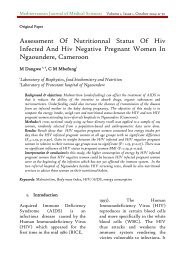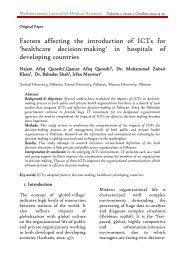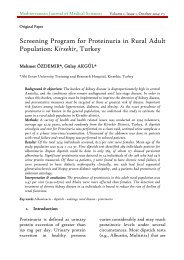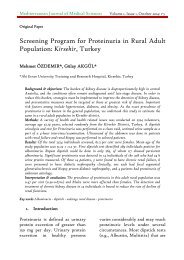Issues and Prospects of e-health in Pakistan
Background & objectives: In connection with access to information in developing countries, information flows through existing networks of communication is a main theme in the current IS literature . Methods:Information-intensive infrastructure is a requirement for information dissemination due to the shortage of network infrastructure in the majority of developing states. It is verified by many researchers that information managing technologies with their main purpose of ‘handling information’ have the advantage to enhance already existing technologies by making better information-communication a priori to new ICT innovations .Presently health information system infrastructure is deficient in resources to meet the demands and needs of increasing population in developing countries. Health care systems of developing countries have major barriers like poverty and lack of technological sophistication. Results:The basic difficulties or barriers in using information technologies include poor or inadequate infrastructure, insufficient access to the hardware and inadequate or poor resources allocation. By eliminating these barriers population health status can be improved in developing countries. Interpretation & conclusion: This study aims to determine the main issues and prospects for ehealth in the current situation of developing countries like Pakistan and the way forward for policy makers to manage all issues in future for more effective and rational decision-making in healthcare organizations. Key words: e-health; challenges; prospects; developing countries; Pakistan
Background & objectives: In connection with access to information in developing countries,
information flows through existing networks of communication is a main theme in the current
IS literature .
Methods:Information-intensive infrastructure is a requirement for information dissemination
due to the shortage of network infrastructure in the majority of developing states. It is
verified by many researchers that information managing technologies with their main purpose
of ‘handling information’ have the advantage to enhance already existing technologies by
making better information-communication a priori to new ICT innovations .Presently health
information system infrastructure is deficient in resources to meet the demands and needs of
increasing population in developing countries. Health care systems of developing countries
have major barriers like poverty and lack of technological sophistication.
Results:The basic difficulties or barriers in using information technologies include poor or
inadequate infrastructure, insufficient access to the hardware and inadequate or poor
resources allocation. By eliminating these barriers population health status can be improved in
developing countries.
Interpretation & conclusion: This study aims to determine the main issues and prospects for ehealth
in the current situation of developing countries like Pakistan and the way forward for
policy makers to manage all issues in future for more effective and rational decision-making
in healthcare organizations.
Key words: e-health; challenges; prospects; developing countries; Pakistan
You also want an ePaper? Increase the reach of your titles
YUMPU automatically turns print PDFs into web optimized ePapers that Google loves.
Mediterranean Journal <strong>of</strong> Medical Sciences V1, I1 October 2014: 31-52 32<br />
developed <strong>and</strong> ma<strong>in</strong>ta<strong>in</strong>ed by<br />
provid<strong>in</strong>g proper tools <strong>and</strong> devices<br />
<strong>and</strong> proper tra<strong>in</strong><strong>in</strong>g on regular<br />
<strong>in</strong>tervals for more rapid access to<br />
<strong>in</strong>formation on <strong>in</strong>ternet. For<br />
h<strong>and</strong>l<strong>in</strong>g users- related issues <strong>and</strong><br />
ma<strong>in</strong>ta<strong>in</strong><strong>in</strong>g regular use <strong>of</strong> ICTs<br />
<strong>in</strong> <strong>health</strong> organizations, <strong>health</strong>care<br />
providers must be given<br />
opportunity to take part <strong>in</strong><br />
<strong>in</strong>formation systems development<br />
process <strong>and</strong> <strong>in</strong>clude the IScontents<br />
accord<strong>in</strong>g to their<br />
requirements (Rezai-Rad et al.,<br />
2012).<br />
Concentrat<strong>in</strong>g on <strong>in</strong>formationcentered<br />
ICT applications <strong>in</strong><br />
develop<strong>in</strong>g countries is<br />
comparatively a new sphere <strong>and</strong><br />
subject <strong>in</strong> the doma<strong>in</strong> <strong>of</strong> <strong>health</strong><br />
<strong>in</strong>formatics (Kimaro & Titlestad,<br />
2008). Sound evidence-based<br />
literature extracted on <strong>in</strong>fluence<br />
assessments or outcome<br />
measurements is still lack<strong>in</strong>g<br />
regard<strong>in</strong>g ICTs-applications <strong>in</strong><br />
the <strong>health</strong>care sector (Rezai-Rad<br />
et al., 2012). Published evidences<br />
are presently available on this<br />
topic <strong>and</strong> are at pilot or the pro<strong>of</strong><strong>of</strong>-concept<br />
stage. In many cases,<br />
the statements are not <strong>in</strong>dividual<br />
analyses, rather are based on<br />
collective skills <strong>and</strong> practices,<br />
consensus statements, <strong>and</strong> policies<br />
(Soar et al., 2012).<br />
The significance <strong>of</strong> the concepts<br />
<strong>of</strong> ‘<strong>in</strong>formation’, ‘<strong>in</strong>formation<br />
first’ has been advocated by many<br />
IS researchers for the successful<br />
adoption <strong>and</strong> use <strong>of</strong> the ITapplications<br />
<strong>in</strong> any organization<br />
<strong>and</strong> <strong>in</strong>volvement towards the<br />
‘<strong>in</strong>formation-centered ICT’<br />
concept is a major example<br />
(Nyella & Mndeme, 2010).<br />
Furthermore the ICT-applications<br />
may only br<strong>in</strong>g small direct<br />
benefits for poverty alleviation<br />
<strong>and</strong> the possibility for ICTapplications<br />
depends on both<br />
f<strong>in</strong>ancial <strong>and</strong> access to cultural,<br />
political <strong>and</strong> educational<br />
resources. And f<strong>in</strong>ally, the access<br />
to social assets <strong>and</strong> <strong>in</strong>creas<strong>in</strong>g<br />
confidence <strong>and</strong> support through<br />
locally contextualized social<br />
networks built through<br />
community-based <strong>in</strong>itiatives is<br />
more crucial than look<strong>in</strong>g for<br />
access to new <strong>in</strong>formation from<br />
digital ICTs (Khoja et al.,2012).<br />
Many studies reveal that doctors<br />
<strong>and</strong> physicians <strong>in</strong> develop<strong>in</strong>g<br />
countries are not given an<br />
opportunity to be take part <strong>in</strong><br />
<strong>in</strong>formation system development<br />
process, consequently IS/ICTs do<br />
not possess the features which are<br />
accord<strong>in</strong>g to the needs <strong>of</strong><br />
<strong>health</strong>care providers (Rezai-Rad et<br />
al., 2012).Although e-<strong>health</strong><br />
systems <strong>in</strong> develop<strong>in</strong>g countries is<br />
not a new concept any longer but<br />
there is sluggish usage <strong>of</strong> <strong>in</strong>ternet<br />
among <strong>health</strong>care providers due to<br />
lack <strong>of</strong> the capability to read, be<br />
©2014 Mediterranean Center <strong>of</strong> Medical Sciences








